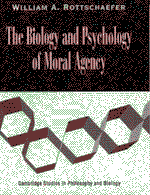Book contents
- Frontmatter
- Contents
- Preface
- Introduction
- PART I MORAL AGENCY AND SCIENTIFIC NATURALISM
- PART II THE BIOLOGICAL BASES OF MORAL AGENCY
- PART III THE PSYCHOLOGICAL BASES OF MORAL AGENCY
- PART IV A SCIENTIFIC NATURALISTIC ACCOUNT OF MORAL AGENCY
- 8 The adequacy of moral beliefs, motivations, and actions: How can biological and psychological explanations serve as justifications?
- 9 Moral ontology: What is the ontological status of moral values?
- PART V INTEGRATING A PERSONALISTIC AND NATURALISTIC VIEW OF MORAL AGENCY
- References
- Index
8 - The adequacy of moral beliefs, motivations, and actions: How can biological and psychological explanations serve as justifications?
Published online by Cambridge University Press: 19 September 2009
- Frontmatter
- Contents
- Preface
- Introduction
- PART I MORAL AGENCY AND SCIENTIFIC NATURALISM
- PART II THE BIOLOGICAL BASES OF MORAL AGENCY
- PART III THE PSYCHOLOGICAL BASES OF MORAL AGENCY
- PART IV A SCIENTIFIC NATURALISTIC ACCOUNT OF MORAL AGENCY
- 8 The adequacy of moral beliefs, motivations, and actions: How can biological and psychological explanations serve as justifications?
- 9 Moral ontology: What is the ontological status of moral values?
- PART V INTEGRATING A PERSONALISTIC AND NATURALISTIC VIEW OF MORAL AGENCY
- References
- Index
Summary
FROM ACQUISITION, ACTION, AND RELEVANCE TO ADEQUACY
I have claimed that a satisfactory account of moral agency must answer questions concerning (1) how moral agency is acquired, (2) how it is put into action, (3) whether the sort of agency that is appealed to is morally relevant, both substantively and functionally, and, finally, (4) whether and how that agency is morally adequate or justified. As an integrationist, I am attempting to develop scientifically based answers to these questions, answers that are both well supported scientifically and account for the phenomenon of moral agency. In particular, I have used the findings of biology and psychology to elaborate an account of how we acquire moral agency and put it to work that adequately describes the phenomenon of moral agency and explains both its acquisition and its execution. Even if I have succeeded in this task, a large and very important question remains about whether and how such scientific findings and theories, that is, scientific facts (indeed, any sort of facts), can help us answer questions about whether our moral beliefs, motivations, and actions are morally justified or justifiable. It is this question that I now undertake to answer. I begin in Section 8.2 by laying out in more detail what is usually thought to be involved in the justification of moral agency.
- Type
- Chapter
- Information
- The Biology and Psychology of Moral Agency , pp. 187 - 215Publisher: Cambridge University PressPrint publication year: 1997



